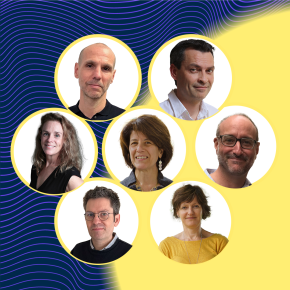Sept scientifiques de CNRS Biologie élus membres de l'EMBO
Le 9 juillet 2024, 120 scientifiques de renom ont été élus membres de l'European Molecular Biology Organization (EMBO), en reconnaissance de l'excellence de leurs recherches et leurs remarquables réalisations dans le domaine des sciences de la vie.
Sept scientifiques de CNRS Biologie figurent parmi les personnalités distinguées.
Pour célébrer les 60 ans de l'EMBO, 120 scientifiques ont été nommés cette année. Les premiers membres de l'EMBO ont été élus en 1964 et depuis, les membres de l'EMBO ont été invités à nommer et à élire des scientifiques exceptionnels pour rejoindre la communauté. Ce groupe initial forme aujourd'hui une communauté de plus de 2 100 membres et membres associés. Les nouveaux membres de l'EMBO rejoignent une liste de scientifiques de renom élus avant eux, qui comprend 92 lauréates et lauréats du prix Nobel.
Source : embo.org
Allison BARDIN
Stem cell regulation and tissue homeostasis
Our group aims to elucidate cell-intrinsic and cell-extrinsic processes controlling stem cell fate and genome stability. Ultimately, we would like to understand the control mechanisms that allow stem cells to promote tissue homeostasis in young, healthy contexts and how these become defective during aging or disease. We combine genetic approaches with genomics and imaging techniques in Drosophila to define conserved mechanisms of stem cell biology.
Génétique et biologie du développement
CNRS/Inserm/Institut Curie
Valérie BORDE
Yeast meiotic and somatic homologous recombination
My lab studies how cells repair the double-strand breaks deliberately induced during meiosis, by homologous recombination. This step is essential for the accurate segregation of homologous chromosomes, and therefore for obtaining gametes (eggs or sperm) with a normal chromosome content, preventing aneuploidy at the source of chromosomal diseases or infertility.
Dynamique de l'information génétique : bases fondamentales et cancer
CNRS/Institut Curie/Sorbonne Université
Arnaud ECHARD
Molecular mechanisms of cell division
Our lab studies cytokinesis, the final step of cell division that leads to the physical separation of daughter cells. Our aim is to discover new molecular mechanisms involved in cytokinetic abscission in eukaryotic cells and to uncover unexpected parallels between cell division and viral budding. We are particularly interested in understanding the membrane and cytoskeletal remodeling steps that are essential for these two topologically related processes.
Dynamique cellulaire physiologique et pathologique
CNRS/Institut Pasteur
Angela GIANGRANDE
Glia and macrophages in immunity and beyond
My laboratory focuses on the molecular and epigenetic mechanisms regulating the development and role of Drosophila glia and macrophages. These cells are involved in the immune response and also control tissue homeostasis by sensing and responding to the environment. Assessing how these mechanisms are evolutionarily conserved allows us to understand the biology of cells that play key roles in development and physiology.
Institut de génétique et de biologie moléculaire et cellulaire
CNRS/Inserm/Université de Strasbourg
Olivier HAMANT
Functions of mechanical signals in plants
My group is working on the role of mechanical signals in plant development. Our research also sheds a new light on the question of robustness of living organisms. In the frame of the Michel Serres Institute, I contribute to several projects in the fields of art, science and education around the existential issues of the Anthropocene.
Reproduction et développement des plantes
CNRS/ENS de Lyon/Inrae
Philippe PASERO
Cellular responses to replication stress
My lab investigates the origin and the consequences of replication stress in yeast and human cells using a combination of single-molecule imaging and genome-wide approaches. Our main research interests include transcription-replication conflicts and R-loops, fork remodeling by SMC complexes, checkpoint signaling, and activation of the innate immune response by cytosolic DNA released from stressed replication forks.
Institut de génétique humaine
CNRS/Université de Montpellier
Teva VERNOUX
Plant hormones and shoot development dynamics
My group explores how self-organization enables robust dynamic development in plants. To do so, we study how hormones drive the dynamics of rhythmic morphogenesis at the shoot apex. We use interdisciplinary approaches, ranging from quantitative live imaging, biosensor development, functional genomics and structural biology to modelling, in order to unravel how these developmental signals act across scales to build a robust shoot architecture.
Reproduction et développement des plantes
CNRS/ENS de Lyon/Inrae

